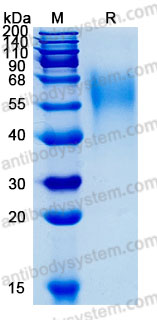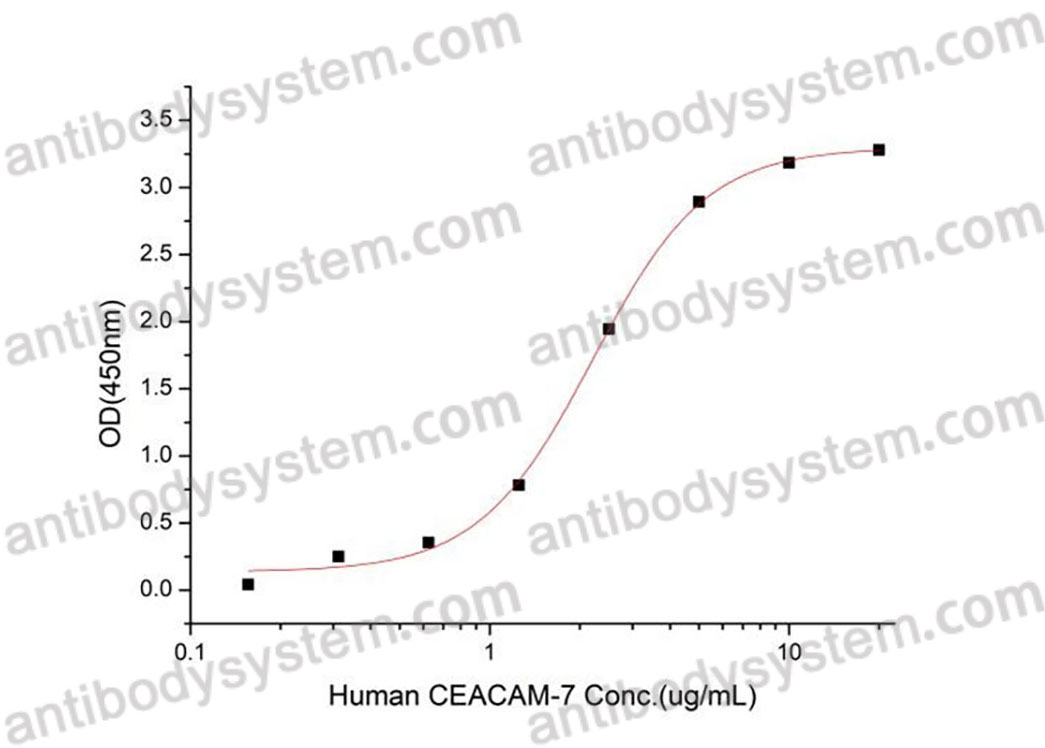Catalog No.
AHE25601
Biological activity
Measured by the ability of the immobilized protein to support the adhesion of calcium ionophore treated human neutrophils. When 2 x 10^5 cells/well are added to CD66c/CEACAM6 (Cat #: AHE25601) coated plates (10 µg/mL, 100 µL/well), 35 ‑ 60% of the cells will adhere after 20 minutes at 37 ℃.
Expression system
Mammalian Cells
Species
Homo sapiens (Human)
Protein length
Lys35-Gly320
Nature
Recombinant
Endotoxin level
<0.1 EU/μg of the protein by the LAL method.
Purity
>90% as determined by SDS-PAGE.
Accession
P40199
Applications
Bioactivity, ELISA, Immunogen, SDS-PAGE, WB
Form
Lyophilized
Storage buffer
Lyophilized from a solution in PBS pH 7.4, 5% Trehalose, 5% Mannitol.
Reconstitution
Reconstitute in sterile water for a stock solution. A copy of datasheet will be provided with the products, please refer to it for details.
Shipping
In general, proteins are provided as lyophilized powder/frozen liquid. They are shipped out with dry ice/blue ice unless customers require otherwise.
Stability and Storage
Use a manual defrost freezer and avoid repeated freeze thaw cycles. Store at 2 to 8°C for one week. Store at -20 to -80°C for twelve months from the date of receipt.
Alternative Names
Normal cross-reacting antigen, Carcinoembryonic antigen-related cell adhesion molecule 6, CEACAM6, CD66c, NCA, Non-specific crossreacting antigen
Hypoxia and Hypoxia-Reoxygenation Potentiate Helicobacter pylori Infection and Gastric Epithelial Cell Proliferation., PMID:40325849
Targeted Suppression of CEACAM6 via pHLIP-Delivered RNAs in Pancreatic Ductal Adenocarcinoma., PMID:40282889
Diagnostic value of CEACAM6 and HE4 in pleural fluid for malignant pleural effusion., PMID:40232301
A Novel Theranostic Strategy for Malignant Pulmonary Nodules by Targeted CECAM6 with 89Zr/131I-Labeled Tinurilimab., PMID:40178153
[CEACAM6 inhibits proliferation and migration of nasopharyngeal carcinoma cells by suppressing epithelial-mesenchymal transition]., PMID:40159971
Comprehensive Analysis of High-Sensitive Flow Cytometry and Molecular Mensurable Residual Disease in Philadelphia Chromosome-Positive Acute Leukemia., PMID:40076750
CircDIAPH1 Promotes Liver Metastasis and Development of Colorectal Cancer by Initiation of CEACAM6 Expression., PMID:39987565
Identification of CD66c as a potential target in gastroesophageal junction cancer for antibody-drug conjugate development., PMID:39918687
Development and biological evaluation of a novel CEACAM6-targeted PET tracer for distinguishing malignant nodules in early-stage lung adenocarcinoma., PMID:39888423
Broad-Spectrum Efficacy of CEACAM6-Targeted Antibody-Drug Conjugate with BET Protein Degrader in Colorectal, Lung, and Breast Cancer Mouse Models., PMID:39812376
The role of CEACAMs in neutrophil function., PMID:39674879
The influence of hypoxia-mediated CEACAM6 upregulation on epithelial cell and macrophage response in the context of gastric cancer., PMID:39674878
Evolution of CEACAM pathogen decoy receptors in primates., PMID:39674876
CEACAM6 facilitates gastric cancer progression through upregulating SLC27A2., PMID:39562695
FLAER Revealed Normally Expected Non-PNH FLAER-Dim Immature Myeloid Cells (CD117+/CD34-) In Bone Marrow Aspirates and Could Be Utilized as a Marker of Hierarchical Hematopoiesis., PMID:39478200
Proteomic profiling reveals CEACAM6 function in driving gallbladder cancer aggressiveness through integrin receptor, PRKCD and AKT/ERK signaling., PMID:39468006
Assessing the potential relevance of CEACAM6 as a blood transcriptional biomarker., PMID:39239252
CEACAM6 Promotes Lung Metastasis via Enhancing Proliferation, Migration and Suppressing Apoptosis of Prostate Cancer Cells., PMID:38944419
Identification of Early Events in Serrated Pathway Colorectal Tumorigenesis by Using Digital Spatial Profiling., PMID:38830348
Phenotypic screen of sixty-eight colorectal cancer cell lines identifies CEACAM6 and CEACAM5 as markers of acid resistance., PMID:38502695
Delivery of a BET protein degrader via a CEACAM6-targeted antibody-drug conjugate inhibits tumour growth in pancreatic cancer models., PMID:38467634
Smoking changes adaptive immunity with persistent effects., PMID:38355791
The emerging roles of CEACAM6 in human cancer (Review)., PMID:38240103
CT109-SN-38, a Novel Antibody-drug Conjugate with Dual Specificity for CEACAM5 and 6, Elicits Potent Killing of Pancreatic Cancer Cells., PMID:38178674
Immunophenotypic portrait of leukemia-associated-phenotype markers in B acute lymphoblastic leukemia., PMID:38037221
Aldolase B-driven lactagenesis and CEACAM6 activation promote cell renewal and chemoresistance in colorectal cancer through the Warburg effect., PMID:37816733
MicroRNA 29a therapy for CEACAM6-expressing lung adenocarcinoma., PMID:37684602
CEACAM6: A Novel Marker of Chronic Obstructive Pulmonary Disease Susceptibility?, PMID:37219336
CEACAM6 as a Novel Therapeutic Target to Boost HO-1-mediated Antioxidant Defense in COPD., PMID:37219322
Clinical, biological, and outcome features of P2RY8-CRLF2 and CRLF2 over-expression in pediatric B-cell precursor acute lymphoblastic leukemia according to the CCLG-ALL 2008 and 2018 protocol., PMID:36814093
Optimization of monocyte gating to quantify monocyte subsets for the diagnosis of chronic myelomonocytic leukemia., PMID:36448679
Combined targeting of soluble latent TGF-ß and a solid tumor-associated antigen with adapter CAR T cells., PMID:36387056
CEACAM6 serves as a biomarker for leptomeningeal metastasis in lung adenocarcinoma., PMID:36082960
Chitinase 3-like 1, Carcinoembryonic Antigen-related Cell Adhesion Molecule 6, and Ectopic Claudin-2 in the Carcinogenic Processes of Ulcerative Colitis., PMID:35896264
Significance of Intraperitoneal-free KRT20 and CEACAM6 mRNA Expression for Peritoneal Recurrence of Gastric Cancer., PMID:35896219
A new strategy to count and sort neutrophil-derived extracellular vesicles: Validation in infectious disorders., PMID:35362257
In high-grade ovarian carcinoma, platinum-sensitive tumor recurrence and acquired-resistance derive from quiescent residual cancer cells that overexpress CRYAB, CEACAM6, and SOX2., PMID:35302657
T cell-mediated elimination of cancer cells by blocking CEACAM6-CEACAM1 interaction., PMID:35141051
Antibody ligation of CEACAM1, CEACAM3, and CEACAM6, differentially enhance the cytokine release of human neutrophils in responses to Candida albicans., PMID:34847408
The Immunomodulatory CEA Cell Adhesion Molecule 6 (CEACAM6/CD66c) Is a Protein Receptor for the Influenza a Virus., PMID:33919410
Identification of cell surface targets for CAR-T cell therapies and antibody-drug conjugates in breast cancer., PMID:33838601
Establishment and Characterization of a New Pancreatic Ductal Adenocarcinoma Cell Line Capan-26., PMID:33788731
CD151 promotes Colorectal Cancer progression by a crosstalk involving CEACAM6, LGR5 and Wnt signaling via TGFβ1., PMID:33767593
Identification of CD318, TSPAN8 and CD66c as target candidates for CAR T cell based immunotherapy of pancreatic adenocarcinoma., PMID:33674603
CEACAMs serve as toxin-stimulated receptors for enterotoxigenic Escherichia coli., PMID:33139570
A Novel Siglec-4 Derived Spacer Improves the Functionality of CAR T Cells Against Membrane-Proximal Epitopes., PMID:32849600
Profiling of gastric cancer cell-surface markers to achieve tumour-normal discrimination., PMID:32816956
CEACAM6 promotes cisplatin resistance in lung adenocarcinoma and is regulated by microRNA-146a and microRNA-26a., PMID:32648688
CEACAM3 decreases asthma exacerbations and modulates respiratory syncytial virus latent infection in children., PMID:32606071
Impact of immunophenotypic characteristics on genetic subgrouping in childhood acute lymphoblastic leukemia: Tokyo Children's Cancer Study Group (TCCSG) study L04-16., PMID:32368831


